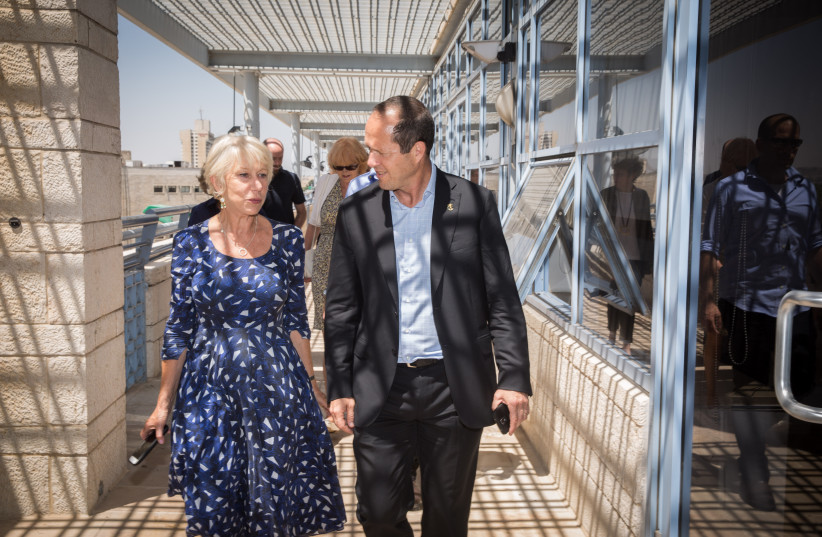In Amazon Prime’s The Marvelous Mrs. Maisel, Rachel Brosnahan shows off classic kibbitzing as Midge Maisel. She has garnered three Emmy Award nominations. The actress isn’t Jewish. Should it matter? No.
I haven’t heard a single suggestion of anyone who would be better than her. There has been criticism, namely by Sarah Silverman, who may have coined the term “Jewface,” that Jewish actors have lost roles to gentile ones. There was a small fuss over Helen Mirren being selected to play Golda Meir, to which Mirren said it’s an “utterly legitimate” question in an interview with The Guardian. The hullabaloo will be forgotten if she is great in the role.
If you woke up Golda from the dead, I bet she’d say “Pick the best actress, regardless of who they pray to. And make sure Iran doesn’t get a nuclear bomb.”
Nobody complained about Charlton Heston playing Moses in The Ten Commandments or Ben Kingsley as Itzhak Stern in Schindler’s List.
In the 2020 film Shiva Baby, Rachel Sennott nailed it as Danielle, a young Jewish woman trying to make it through a traumatic afternoon. She’s not a member of the tribe. So what?

SUSIE ESSMAN, from the cast of HBO’s Curb Your Enthusiasm, told me she had recently read Leave The Gun, Take The Cannoli about the making of The Godfather, being shown in select theaters for its 50th anniversary. In the book, author Mark Seal explains the goal was to cast Italian actors. However, James Caan and Abe Vigoda, two Jewish actors, got the roles of Sonny Corleone and Sal Tessio; Marlon Brando, the lead, was not Italian, but put shoe polish in his hair to darken it.
“There was an effort to cast Italian actors,” said Essman, who is Jewish. “The reasoning that they gave, and I think they’re correct, was they could ‘smell the garlic.’ It’s the same thing with Jewish actors. I could smell the gefilte fish. It’s not work [for them] to play a Jewish character, so it’s generally true.
“If you’re a great actor, you can play anything, by and large. But I think there is something to having an understanding of the world [that you are portraying] if you cast a Jewish character with a Jewish actor, or an Italian character with an Italian actor. It’s not across the board. It can always be overcome. But there is something to it.”
Isaac Zablocki, director of the Carole Zabar Center for Film at The Marlene Meyerson JCC Manhattan, said it’s a complex question. According to Zablocki, Jews took pride in having big stars in Jewish roles, even if the actors were not Jewish. He noted that black actors and those with disabilities have been underrepresented in film, with black actors even being mistreated. Zablocki believes it’s wrong for a white person to play a black person, and able-bodied people shouldn’t play those with disabilities.
“The question is, is the Jewish community underrepresented and misrepresented?” he asked via email. “I would say that underrepresentation would be hard to argue in Hollywood; nevertheless, bias and antisemitism still sadly exist.
“I long for the day when every minority has equal access to roles and anyone can play whoever they want because negative representation has been wiped out. Then we can cast on merit alone. But until that day comes, we need to pay close attention to any role we cast and do our best to include underrepresented minorities as much as possible.”
CASTING DIRECTORS want the biggest names and authenticity. At a time when Jews are getting beaten up and major network hosts don’t understand what the Holocaust was about, priorities are important.
I don’t see the point in jumping on the bandwagon when we are talking about different roles. And look how well Michael Aloni, a secular Jew, played an ultra-Orthodox Jew in Shtisel. Should we then say only an Orthodox Jew can play an Orthodox Jew?
Rena Strober is a singer and actress who is Jewish; while singing at Rao’s, an Italian restaurant in Manhattan in 2003, she was famously interrupted by a Mafia murder sparked by an argument over her song. She recalled that she was a finalist for the role of Hodel in Broadway’s Fiddler on The Roof but didn’t get the part; however, she did perform in the national tour.
Now based in Los Angeles, she said, “the times have changed and people are speaking out. When casting Jewish roles, they should first try to find a Jewish actor.”
Legislating decision-makers when it comes to art can be a slippery slope. Isn’t it illegal to ask someone’s faith in a job interview? If an actor’s life experience makes the director feel that the actor is authentic and perfect for the part, great. But a religious belief should not be a prerequisite. Those who cast the roles must be able to pick who is best, irrespective of religion, and without fear of a social media backlash.
The writer has has written for numerous outlets, including The Jewish Week, JNS and Tablet.
